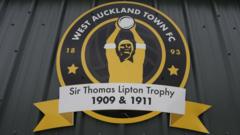Who Were the Amateur English Team That Became the First World Champions?

Sir Thomas Lipton and the Birth of the First Global Football Tournament
In the realm of football, the name Sir Thomas Lipton may not immediately resonate with the same weight as legends like Pelé, Diego Maradona, or even contemporary stars like Lionel Messi. However, his influence on the beautiful game is undeniable, as he played a pivotal role in organizing the first global football tournament, highlighting an unusual yet proud chapter in sporting history. This narrative, marked by amateurism and sheer determination, revolves around West Auckland Town, a club from County Durham, England, which was crowned as the first world champions of football in 1909.
The Historical Context of Football in the Early 20th Century
To fully appreciate the significance of West Auckland's achievement, it is essential to understand the historical context of football during the early 20th century. The sport was gaining momentum across Europe, with national leagues and competitions forming as clubs competed for local and regional glory. However, there was no formal global tournament akin to today’s FIFA World Cup.
The idea of a universal competition was sparked by Sir Thomas Lipton, a successful businessman, and philanthropist who was passionate about the sport. His vision was to create a platform for clubs rather than national teams to showcase their talent on an international stage. This ambition led to the inception of the Sir Thomas Lipton Trophy, an event that would eventually see West Auckland Town emerge as the first champions.
West Auckland Town: The Underdogs from County Durham
West Auckland Town, at the time, was a small, amateur football club competing in the Northern League Division One, which represented the ninth tier of the English football league system. Made up primarily of coal miners, the team's origins were humble, yet their spirit and determination were anything but.
Local historian Martin Connolly has delved into the circumstances that led to West Auckland being selected for the tournament. While some myths suggest that Lipton mistakenly invited the wrong team, Connolly argues that the Northern League was well-regarded for its competitive teams, and West Auckland was a logical choice given their promising talent and community spirit.
The Journey to Turin: An Epic Adventure
With the invitation to compete in the Sir Thomas Lipton Trophy accepted, West Auckland faced the daunting task of funding their trip to Italy. The players, who were not financially supported by professional contracts, had to dig deep into their pockets. Some even sold personal belongings to afford the travel expenses.
The journey itself was an adventure. The team traveled by bus to Darlington, then took a train to London. From there, they embarked on a ferry to Calais, France, before finally making their way to Turin, Italy. The journey was arduous, filled with uncertainty and excitement, but the players remained focused on their goal: to prove themselves on an international stage.
The Tournament Unfolds: West Auckland's Historic Wins
The tournament featured clubs from several European nations, with West Auckland Town facing formidable opponents. In the opening match, West Auckland clashed with Stuttgart, the German champions, and against all odds, they emerged victorious with a 2-0 win. This unexpected success set the stage for a final against FC Winterthur from Switzerland.
In the final, West Auckland continued their impressive form, winning 2-0 once again. Remarkably, the club did not concede a single goal throughout the tournament, a feat that solidified their status as the first world champions of football.
West Auckland's Victorious Return
The triumph in 1909 was not merely a fleeting moment of glory; it was a monumental achievement for a team composed of amateur players. Connolly stated, "In terms of achievement, this rates as about the best ever," emphasizing the significance of a mining team defeating some of the best clubs in Europe. The victory resonated deeply within the community, echoing a sense of pride that would carry on for generations.
Defending Their Crown: The 1911 Tournament
Two years later, West Auckland was invited back to defend their title, a testament to their previous success. The 1911 tournament saw them face new challengers, including renowned teams like Torino and Juventus. Once again, the amateur side demonstrated their skill and tenacity.
In an exciting Easter Sunday match, West Auckland narrowly defeated Torino 3-2, securing their place in the final against Juventus. In a stunning display of football prowess, they triumphed with a staggering 6-1 victory, thereby retaining their title and earning the trophy outright.
The Fate of the Trophy: Financial Woes and Loss
Despite their monumental successes, West Auckland Town faced significant financial challenges upon returning home. Within a year of their monumental victories, the club was forced to sell the prized trophy to settle debts, a heartbreaking decision that showcased the harsh realities of amateur football during that era.
The trophy changed hands several times and was eventually sold back to the club in 1960 for £100. However, in 1994, the original trophy was stolen, and it has never been recovered. Today, the club proudly displays a replica, but the loss of the original trophy does not diminish the pride and legacy of West Auckland Town.
The Legacy of West Auckland Town
Despite the ups and downs, West Auckland Town's story remains a source of inspiration and pride for the local community. The village celebrates its rich footballing heritage, with signs proclaiming "Welcome to West Auckland - Home of the First World Cup." In 2013, a bronze statue commemorating the team’s victories was unveiled, symbolizing the enduring legacy of their achievements.
Over £200,000 was raised to erect the statue, reflecting the community's commitment to honoring its sporting history. Local Councillor Robert Yorke emphasized the importance of this achievement, stating, "It was such an achievement back in 1909 for these footballers to raise the money and then travel to Europe to play and then win the world's first football tournament." This sentiment resonates strongly with many local residents, who view the club's victories as an integral part of their identity.
West Auckland in Modern Football Culture
While West Auckland Town's story may not be as widely recognized as that of the FIFA World Cup, it holds a cherished place in the annals of football history. The remarkable journey of a mining team representing England on the world stage serves as a unique reminder of the sport's roots and the spirit of competition.
In popular culture, West Auckland's victories have not gone unnoticed. The ITV drama "A Captain's Tale," released in 1982, documented their journey, helping to bring the story to a broader audience. Today, the club continues to celebrate its heritage, inspiring future generations of footballers and fans alike.
Conclusion
West Auckland Town's remarkable achievement in the inaugural Sir Thomas Lipton Trophy remains a testament to the spirit of amateur football. Their victories in 1909 and 1911 not only crowned them the first world champions but also laid the groundwork for future global competitions. While the world of football has evolved significantly since then, the essence of determination, teamwork, and local pride remains timeless. As we reflect on this extraordinary chapter in football history, it prompts us to consider: what other untold stories lie hidden in the depths of sporting lore?
Frequently Asked Questions
Who was Sir Thomas Lipton?
Sir Thomas Lipton was a British entrepreneur and philanthropist who is known for founding the Lipton tea brand. He played a significant role in the early 20th century by organizing the first global football tournament, the Sir Thomas Lipton Trophy.
What was the significance of the Sir Thomas Lipton Trophy?
The Sir Thomas Lipton Trophy was the first global football tournament featuring club teams from different countries. It marked a significant step in the evolution of international football competitions.
How did West Auckland Town become world champions?
West Auckland Town, an amateur team from County Durham, won the Sir Thomas Lipton Trophy in 1909 and 1911, becoming the first world champions by defeating teams like Stuttgart and Juventus without conceding a goal in their initial tournament.
What happened to the original trophy?
The original Sir Thomas Lipton Trophy was sold due to financial difficulties faced by West Auckland Town and was stolen in 1994. The club now owns a replica of the trophy.
How is West Auckland Town remembered today?
West Auckland Town is celebrated as the 'Home of the First World Cup,' with commemorative signs and a bronze statue erected in honor of their achievements. Their story continues to inspire local pride and sporting heritage.
Reflecting on the incredible journey of West Auckland Town and the impact of Sir Thomas Lipton's initiative, one must ask: how many other forgotten heroes of the sport are waiting to be rediscovered? #WestAucklandFC #FootballHistory #FirstWorldCup
Published: 2025-07-12 07:43:26 | Category: sport



